
Table of Contents
A glass partition wall is a transparent or translucent wall made primarily of glass panels. It’s used to divide interior spaces while allowing light to pass through. They come in various designs and are commonly used in offices, commercial spaces, and modern homes for their aesthetic appeal and ability to improve natural light.
In this article, we will explore the disadvantages of glass partition wall. We will explore where we should use it and where should not use and also the other disadvantages including the cost, privacy issue, maintenance challenges, cleaning challenges, and also others.
High Cost Of Installation
One of the primary disadvantages of glass partition walls is the high cost of their installation. Compared to solid walls, glass partitions require specialized materials and expertise, making them more expensive. This cost can be a significant factor for businesses with budget constraints.
Lack Of Acoustic Privacy
Glass partition walls allow visual connectivity, but they often do not provide acoustic privacy. Sound easily travels through glass, which can lead to distractions and reduced concentration in the workplace. This disadvantage is particularly problematic in settings that require confidentiality and concentration, such as meeting rooms or private offices.
Reduced Confidentiality
Glass partition walls compromise confidentiality as they offer limited visual privacy. Employees may feel uncomfortable having sensitive conversations or working on confidential documents in a transparent environment. This lack of privacy can hinder productivity and inhibit open discussions.
Maintenance And Cleaning Challenges
Maintaining and cleaning glass partition walls can be a time-consuming and labor-intensive task. Fingerprints, smudges, and dust are more visible on glass surfaces, requiring frequent cleaning to maintain a polished and professional appearance.
Limited Flexibility
Unlike traditional walls, glass partition walls provide limited flexibility in terms of rearranging office layouts. Once installed, they are challenging to relocate or modify. This shortage of flexibility can be problematic when businesses need to reconfigure their workspace or adapt to changing needs.
Contact Us For Unique Products And Services
Glare And Reflection Issues
Glass partition walls can introduce glare and reflection problems. Glare on computer screens can cause eye strain and reduce employee comfort, ultimately impacting productivity. Additionally, excessive reflections can make it difficult to view content displayed on screens or whiteboards.
Security Concerns
Glass partition walls may raise security concerns for businesses. While they can improve transparency and collaboration, they also provide a clear view of valuable equipment and sensitive information. This visibility increases the risk of theft or improper access, requiring additional security measures to safeguard assets.
Susceptibility To Breakage
Glass partition walls are more sensitive to breakage compared to traditional walls. Accidental impacts or high-force collisions can result in shattered glass, posing safety hazards to employees. This exposure may require additional safety measures and precautions to ensure the well-being of individuals in the workspace.
Temperature Regulation
Glass is a poor insulator, which means glass partition walls can contribute to temperature regulation issues. In colder climates, heat loss through glass surfaces can lead to increased energy consumption and higher heating costs. Likewise, in warmer climates, the heat gained through glass can strain cooling systems and impact energy efficiency.

Lack Of Customization Options
While glass partition walls offer a sleek and modern aesthetic, they often lack customization options. Unlike traditional walls that can be painted or adorned with artwork, glass partitions limit opportunities for personalization and branding within the workspace. This can result in a generic and impersonal atmosphere.
Impact On Energy Efficiency
The transparency of glass partition walls can impact energy efficiency in office spaces. Heat transfer through glass can affect the effectiveness of heating, ventilation, and air conditioning systems, leading to increased energy consumption. This can have a negative impact on both the environment and the company’s energy costs.
Durability And Longevity
Glass partition walls may not be as durable and long-lasting as solid walls. While they are designed to withstand normal wear and tear, glass can be more prone to scratches, cracks, and chips. These damages can diminish the overall appearance and functionality of the partitions over time, necessitating costly repairs or replacements.
Health And Safety Risks
The presence of glass partition walls introduces potential health and safety risks in the workplace. Accidental collisions or employees not noticing the presence of transparent barriers can lead to injuries. Additionally, in emergency situations, glass partitions can impede quick evacuation or hinder access for first responders.
Conclusion
Glass partition walls offer several advantages, such as enhanced natural light and visual connectivity, in modern office designs. However, it is essential to consider the disadvantages they bring to workspaces. Factors such as high installation costs, lack of acoustic privacy, reduced confidentiality, and maintenance challenges should be taken into account when deciding whether glass partition walls are suitable for a particular office environment. For more informational articles like these you can visit our website https://halsinternational.com/
